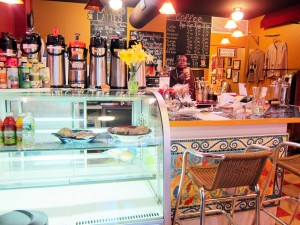
Cheryl Seligman, Features Editor
When times get tough, UR students brave the long lines at Starbucks, Pura Vida and Connections to get their hands on some caffeine. Maybe 9:40 a.m. isn’t that early in the grand scheme of things, but it’s the crack of dawn to many college students, and thus, coffee becomes necessary.
Every Tuesday and Thursday morning before my first class, three full Gold Line buses unload and many of the riders rush straight for Connections. Even during less popular coffee hours, there’s almost always someone perusing the baked goods, inquiring about the Soup du Jour or ordering coconut almond fudge coffee. Flavors like that are pretty hard to pass up after all.
Brought to UR by student demand in 2006, the Coffee Connection — located on South Avenue in the Southwedge neighborhood of Rochester — provides the coffee for the campus café. However, it comes to that shop directly from Peru, Guatemala, Nicaragua, Honduras, Columbia, Costa Rica, Indonesia and Ethiopia, the last of which is coffee’s birthplace.
The Coffee Connection is a not-for-profit business that sells fair trade, organically grown and sustainably-farmed coffee, which is roasted on site — the giant machine that makes it is named Daisy. But even as a business, what the workers offer their customers is next to nothing compared to what the shop provides for its women.
Now in partnership with Project Empower — a holistic program designed to help women in recovery from drug addiction reach their full potential and offer them continuous support — the Coffee Connection provides employment training and serves as a location for women to complete their required volunteer hours and assignments through the Work Experience Program (WEP). Administered through the Division of Human Resources, the goal of the WEP is to restore participants to self-sufficiency by helping them improve their skills and develop new abilities. Founder of Project Empower and Executive Director for the Coffee Connection Joy Bergfalk explained that the shop’s name is actually derived from the concept of connecting the women in recovery here with the farmers in Peru that were found to be growing coca for cocaine, who eventually switched to grow coffee beans.
Even on a much smaller scale, that international effort to clean up the drug industry is observable through the Coffee Connection’s initiatives.
“The Coffee Connection was one of the first businesses that opened up in the renewal of the Southwedge area,” Bergfalk said in detailing the efforts of Nancy Sawyer Molina, the shop’s founder who has worked with the police department to get drug dealers off the neighborhood streets.
Many of the women who work at the Coffee Connection have been through incredible amounts of trauma and pain, including many relapses. Some even find themselves in jail. But through the job training at the coffee shop, the women are encouraged to discover their own strength and beauty, as well as to problem solve.
Bergfalk explained that what often happens when people relapse is they go to prison or back into treatment, but she’s found that the women at the Coffee Connection are finding themselves in that position less frequently and that their relapses don’t last as long.
“One of our jokes is that we’re a life sentence if you want us to be,” she stated.
The hope is that these women will find permanent stability and transform. Bergfalk helps the women through what she calls conflict transformation, rather than conflict resolution.
“We actually bring people to a new place,” she said. “We talk about living from a different place, changing the energy. It’s restoring relationships and giving people new tools to live in a new way.”
The Coffee Connection also places a significant focus on the ideals outlined in the serenity prayer — “God grant me the serenity to accept the things I cannot change; courage to change the things I can” — a profoundly important text in the context of recovery and beyond.
“It’s good for all of us,” Bergfalk said, referencing the prayer. “We spend so much time fretting over what we cannot change.”
She works to promote putting energy toward what can be changed and what can be done.
Lashonda Brown-Scott, one of the women who works at the Coffee Connection, started about two weeks ago.
“I love it,” she said enthusiastically. “It’s a good experience for me because I hadn’t worked since I was 17.”
Brown-Scott is now 36 years old.
“I’m in recovery, so [coming here] helps me get my priorities straight,” she revealed. “I’ve learned to communicate better and to listen more. It’s helped me. I feel more empowered.”
Brown-Scott explained that she wants to get up each day and go to work. She likes having something to do that gets her out of her house and her comfort zone. “I’m more willing today than I was before,” she said.
She also remarked that she likes coming to a place where she isn’t being judged on her history.
“That’s inspirational to me,” she said. “I look forward to coming here.”
Nicole Messmer also works at the coffee shop. “I love coming here,” she stated. “I love working here … knowing you can talk to people who understand what you’re going through.” Messmer explained that a symptom of relapse is isolation and that coming to work helps her keep from separating herself from those around her.
The Coffee Connection is more than a business — it’s a place of empowerment and opportunity. So, next time you stop into Connections, whether it’s before your 9:40 class or on a Sunday evening of studying in Gleason, know that you’re not just buying a cup of coffee, but also “helping women live into their full potential.”
Seligman is a member of the class of 2012.




